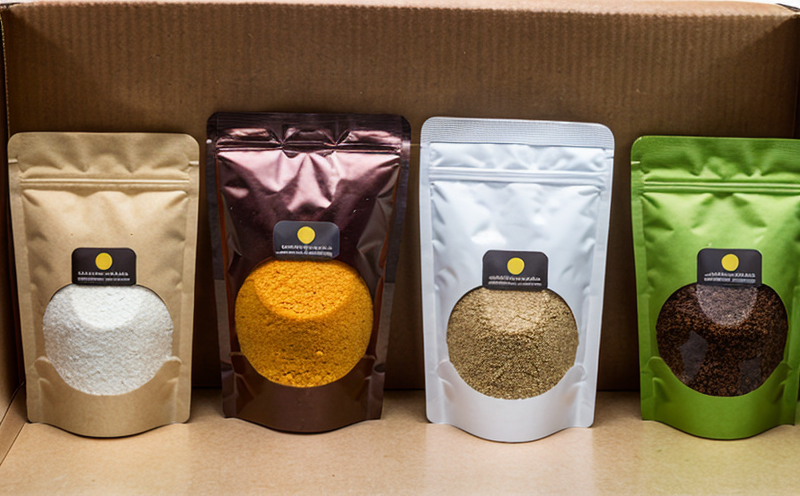Migration Testing of Essential Oils from Packaging
The migration testing of essential oils from packaging is a critical process that ensures consumer safety and compliance with international standards. This service involves analyzing the transfer of volatile compounds, such as essential oils, from packaging materials into food or beverage products during storage and use. The primary goal is to identify potential health risks associated with these migrations.
Essential oils are widely used in food contact materials (FCMs) due to their flavor-enhancing properties. However, the migration of these oils can lead to adverse effects on human health if not properly managed. Regulatory authorities worldwide have stringent requirements for the safety and quality assurance of FCMs, including essential oil-containing packaging.
Our laboratory specializes in providing comprehensive testing services that adhere to international standards such as ISO 21570, which outlines the procedures for determining the migration of constituents from packaging into food contact materials. We also follow other relevant standards like EN 10396 and ASTM E985. These standards ensure that the testing methods are consistent, reliable, and scientifically sound.
The testing process begins with careful specimen preparation. We use representative samples of the packaging material to simulate real-world conditions as closely as possible. This involves replicating the intended storage environment, including temperature, humidity, and exposure duration. After preparing the specimens, we conduct a series of tests using advanced instrumentation such as gas chromatography-mass spectrometry (GC-MS) and high-performance liquid chromatography (HPLC).
The results from these analyses are meticulously reported in accordance with the client's requirements. Compliance reports are provided to ensure that all findings meet or exceed regulatory standards. Our team of experts interprets the data, offering insights into potential risks and mitigation strategies.
Migration testing is essential for ensuring product safety throughout the supply chain. By identifying any hazardous substances early in the process, we help our clients maintain a high level of quality and consumer trust. This service plays a crucial role in safeguarding public health by preventing the release of harmful compounds into food or beverage products.
In summary, migration testing of essential oils from packaging is vital for maintaining product safety and compliance with international standards. Our laboratory offers reliable, accurate, and compliant testing services to help clients protect their consumers and meet regulatory requirements.
Why It Matters
Migration testing of essential oils from packaging is not just a formality; it's a critical measure that ensures the safety of food contact materials. The migration process can lead to the transfer of volatile compounds, which may pose health risks if they exceed permissible limits set by regulatory bodies.
- Health Risks: Volatile compounds from essential oils can migrate into food or beverage products and potentially cause adverse effects on human health.
- Regulatory Compliance: Failure to comply with international standards could result in product recalls, legal action, and damage to brand reputation.
- Consumer Trust: Ensuring the safety of packaging materials builds trust between manufacturers and consumers, fostering long-term relationships.
The importance of migration testing cannot be overstated. It is a cornerstone of quality assurance that protects public health while maintaining regulatory compliance.
Applied Standards
Migration testing of essential oils from packaging follows specific international standards designed to ensure the safety and quality of food contact materials. These standards provide clear guidelines on how to conduct the tests, interpret results, and report findings.
- ISO 21570: This standard specifies methods for determining the migration of constituents from packaging into food contact materials. It is widely recognized in Europe and other regions.
- EN 10396: Developed by European standards, this document provides specific requirements for the safety assessment of FCMs used with alcoholic beverages.
- ASTM E985: This American standard outlines procedures for determining the migration of constituents from packaging into food and beverages. It is frequently referenced in North America.
These standards are regularly updated to reflect the latest scientific understanding and regulatory requirements, ensuring that testing methods remain relevant and effective.
Quality and Reliability Assurance
- Accurate Instruments: We use cutting-edge analytical equipment such as GC-MS and HPLC to provide precise and reliable test results.
- Expertise: Our team of highly qualified scientists and engineers ensures that all tests are conducted with the highest level of expertise.
- Certified Laboratories: Our facilities are accredited by reputable bodies, ensuring that our testing meets international standards.
- Data Integrity: We maintain strict protocols for data management to ensure accuracy and transparency in reporting.
Our commitment to quality is reflected in every aspect of the testing process. From specimen preparation to final report generation, we adhere to stringent procedures that guarantee accurate and reliable results.





